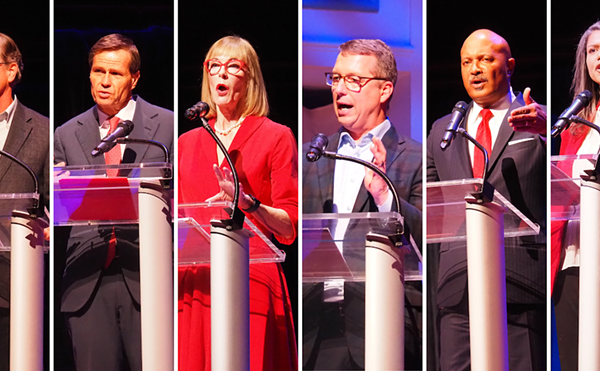|
Marty Brennaman entered the Reds radio booth in 1974. A son had already been born. Taking their first breaths with Pete Rose's arrival from the West Side in 1963, the child and the Cincinnati ball club grew from precocious toddlers with true prospects for marking the world when Brennaman called his first pitch at Riverfront Stadium.
The Reds have added Brennaman's 43-year-old son, Thom, to their broadcasting team this year, and, if the ball club no longer is so prosperous, their broadcasts are among the most lively, straight talking and edgy to be found in the major leagues today. Thom Brennaman isn't just happy to be here. He wants to see the game played right.
Unlike his father, who came to Cincinnati from the minor leagues, Thom Brennaman returns home after walking the block a few times, calling the Chicago Cubs, the Arizona Diamondbacks and national games on Fox over the past 17 years. One remembers a favorite remark among the volumes from Marty Brennaman. Sometime in the early 1990s, when Thom Brennaman worked the Cubs games, a friend asked Marty, in good fun, "How's that kid or yours, running the streets of Chicago until all hours of the night?" Said Marty, in all seriousness, "A kid his age should be running the streets."
So Thom Brennaman has run the streets, he's seen winners and losers, he knows the difference and he says so. Among the younger Brennaman's pet peeves are hitters hacking at first pitches out of the strike zone, hitters working good counts into bad counts against wild pitchers, fielders throwing to the wrong base and pitchers who don't throw strikes. You know who else counts those as pet peeves? Big league managers.
Does Thom Brennaman sound a little grumpy? Well, he is watching the Reds. Many have expressed disappointment that his remarks often initiate tension with his partners, as if two guys talking through a baseball game are supposed to be in complete agreement. But complete agreement about a baseball game too often means complacent radio and weak television.
Indeed, nothing dulls and dumbs down the general discourse about baseball quite like play-by-play men who are so deferential toward former players in the next seat that the latter get away with insipid pronouncements. The mere fact that someone played in the big leagues doesn't guarantee that he's capable of intelligent remarks about the game or anything else.
Chris Welsh, the Reds' television color commentator, is a very bright man and a better analyst than just about anyone in any booth. The broadcasts are all available on MLB.com, so you can click around and see for yourself.
But if Thom Brennaman challenges Welsh on some point, we're all better for it because Welsh is forced to clarify his position against vigorous objections. It's not like Welsh is going to melt down on the air because he can't stand up to it. Welsh has served Reds fans well for 15 years alongside George Grande. Unlike the interplay between Thom Brennaman and Welsh, the interplay between Grande and Welsh is largely sympathetic.
Welsh played in the major leagues, and Grande played with 14 future major leaguers at the University of Southern California in the 1960s. They know what people go through playing baseball at the highest levels.
But those of us who know it's hard even to play baseball at much lower levels also know big leaguers don't always get it right. In other words, speaking only for those of us older than 40, we've all played the game. We might not have played it especially well or for very long, but we've played it enough to know the rules, the strategies, the pratfalls and the correct plays.
We know why hitters swing at pitches that come in at eye level — that ball looks like you're going to kill it. That doesn't mean you should swing. We know why hitters swing and miss, why they get doubled off base on line drives to infielders, why they should run out every ball, why they should throw to the cut-off man, why outfielders lose fly balls in the sun. We understand. That doesn't mean transgressions should be ignored.
Baseball is nuanced but not abstract beyond comprehension. The difficulties in comprehension are more visceral, pointing to why we're at once awed and dumbfounded by the performances of major league players.
On one hand, we understand that everyone is gifted differently and we can't all summon the skill to play in the major leagues. On the other hand, those of us who've stopped playing often can't fathom why players who've ascended to the big leagues with all their skills should play soft or make the same dopey errors we made when we played. They're supposed to be better baseball players than we are.
Among the most disingenuous remarks by players about their critics in the public and the media are those along the lines of, "They don't know how hard it is to play baseball." No assessment could be more naive, self-serving or self-deceptive.
Most observers know exactly how hard it is to play baseball. Many stopped because it was too hard, owing to lack of skill, training, money or parental support. Others stopped because they preferred other flavors of life. And they still know ineffectual baseball when they see it.
Marty and Thom Brennaman aren't playing baseball. They're broadcasting, along with Welsh, Grande and Jeff Brantley. Done right, it requires critical engagement with the game. Thus we applaud a broadcast's honesty, brutal though it might be.
People might watch the news and reality television because they're fascinated by rogues. That's not why they watch baseball.
They want to see baseball played right. They're not interested in struggle, because they struggle. They find struggle tedious and incompetence destructive.
Like Marty Brennaman, Thom speaks to the viewers' frustration when the Reds goof and their pleasure when the Reds prosper. Sometimes the proceedings grow contentious. Which is, in part, why one can hardly wait until the next broadcast.





